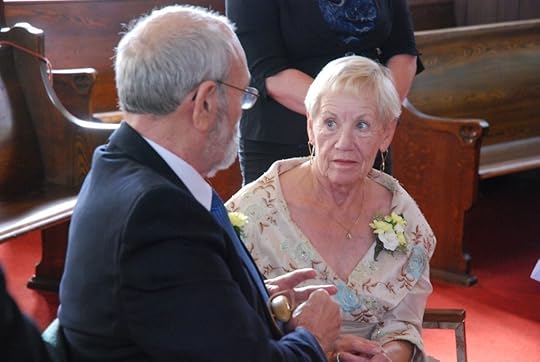Letter to my Mother: Writing the Next Chapter
When we were together last September, when in the afternoons we’d sit in the backyard, near the weeping birch, and talk, we discussed the idea of you telling a story. In those warm days of September neither of us could imagine what you would soon face; then we were rebuilding our relationship after so many difficult years, and you were emerging once more, my mother.
We talked then of you writing the story of your childhood; of growing up in a gold mining town in Northern Ontario, and of losing your father at the age of five. Too young to really know him or have much in the way of memories; instead, you were raised by your mother and older brother. It wasn’t an easy upbringing. We talked about how to write that story; without bitterness or guile. People aren’t inspired by resentment; what they want to read is a story of hardship, honest, simple achievement and of what life was like in a very interesting place, and time.
I asked you: what is the story you want to tell about the first chapters of your life?
When I drove you to the airport and said goodbye at the gate, I was filled with hope and love. You and I haven’t had an easy go of it. It’s nobody’s fault. I wasn’t a very good kid when I was a teen: I drank, and snuck out of the house a lot and was moody and angry. You drank too, and didn’t want to let go, or face your own fears. We clashed. For a long time we were at each other’s throats; it wasn’t easy on either of us.
But over the last decade we’ve started to grow back together. We’ve both grown up a little, and time can take the edge off; make it easier to forgive.
When I left the airport I called your partner, Ernie. I was excited about your future, and wanted to share that with him. He was excited too, and I could feel the hope he shared for the future.
excited too, and I could feel the hope he shared for the future.
He proposed to you when you got off the plane. Who says you don’t get second changes, or third?
Six weeks later you got married. And four weeks after that, the ailment that had forced Ernie to sit during your wedding ceremony was confirmed as cancer.
And now he is gone. And you are alone once more. And it leaves you, and me, heartbroken.
The last year has been hell. There’s no other way to say it. In and out of the hospital during the rapid decline of your third husband, the second to be stolen by cancer in a decade. The last few weeks were more than anybody should have to endure; to lose a soul mate, one you hoped to have in your life for a few more years: just a few more years to love, to debate (and yes, argue), to share tender moments with, to discover what life’s true purpose is.
It would be understandable for you to sink lower, deeper into despair. You’ve spent a lot of your life living with regret, and its made you angry at times, lonely at others, and most of all, bitter about what could have been, but hasn’t become.
And now you have a choice to make: what do you want the next chapter of your life to be?
You can write this chapter any way you want. Yes, there are limitations: you’re struggling with a lot of physical challenges. Some of these there is nothing that we can do anything about. Some we can find treatments for, and some you can control wholly.
But within the confines of these maladies, you still have a choice. You can choose to accept control over your decisions and the consequences of those choices. You can choose to be happy; unreasonably so if you have to. Nobody would blame you if you decided to slip from mourning into a deeper despair, and resentment. But if you’re going to author this next chapter, why not choose to make it about service, about a modicum of joy, about peace?
You have it within you. I know you do. I told you at lunch before I left Hamilton that what I wanted more than anything was to see you smile again; for you to know happiness. You’re not alone; you have Chantel and I and you have friends. But the sort of happiness you must seek now can’t be dependent on others; you’re going to have to find it within. It might be centred on community, or on faith or service, but at the end of the day, you’re the one holding the pen: only you can write the story.



